The writer Grigoriy Kanovich has passed away at the age of 93. Our deepest condolences to his sons Sergejus and Dmitrijus, wife Olga and his many friends and fans around the world. He served as chairman of the Lithuanian Jewish Community from 1989 to 1993, when he moved to Israel.
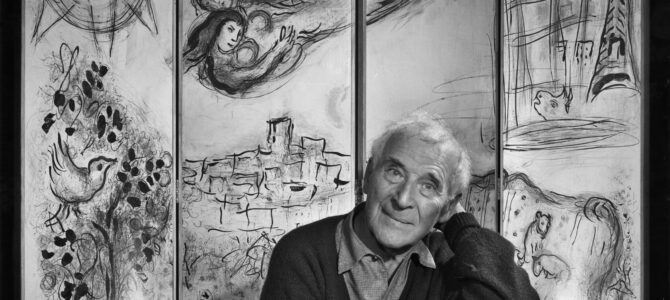
Marc Chagall: World in Turmoil
“The whole history is packing bundles and getting away. Nobody else can be as tender and delicate with bundles. That’s a Jewish man tying a bundle.”
Those lines from Arthur Miller’s Monte Saint Angelo aptly characterizes an unusual exhibit of paintings by Marc Chagall during his period of exile from the 1930s and 1940s which opened in Frankfurt and will run till February 19, 2023. The exhibit is called World in Turmoil.
“A few kilometers from there is a place, more precisely a town, which I haven’t visited for a long time, but I always remember it. So I took advantage of your invitation to go and wander around there a little,” Marc Chagall said at the World YIVO Conference held in Vilnius (Wilno) on August 14, 1935.
This conference is mentioned in the artist’s biography and the catalog for the exhibit at that time. His journey back to Poland (now Lithuania) gave rise to works which appear unusual and dark for Chagall. His oeuvre is usually arranged chronologically, from his native Vitebsk, striving to reattain this magical homeland. In Vilnius Chagall comes as close as possible to actually returning.
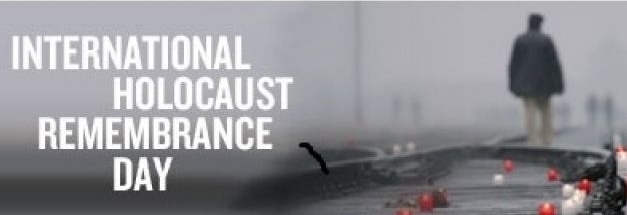
International Day of Commemoration in Memory of the Victims of the Holocaust
To mark the International Day of Commemoration in Memory of the Victims of the Holocaust instituted by the United Nations in 2005, the Lithuanian Jewish Community will host a presentation of Vytautas Magnus University teacher Linas Venclauskas’s monograph about Lithuanian anti-Semitism and of Vytautas Toleikis’s book about the portrayal of Jews in Lithuanian literature.
The two presentations in Lithuanian begin at 6:00 P.M. on Thursday, January 26 at the Lithuanian Jewish Community in Vilnius. Note the United Nations’ International Day of Commemoration in Memory of the Victims of the Holocaust. more commonly called International Holocaust Remembrance Day, is officially on Friday, January 27, to mark the anniversary of the liberation of the Auschwitz-Birkenau concentration camp complex by the Soviet Red Army in 1945.
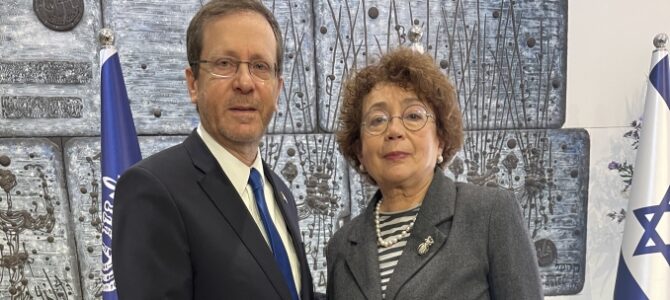
LJC Chairwoman Attending Conference of European Jewish Leaders in Israel
Lithuanian Jewish Community chairwoman Faina Kukliansky is attending a conference of European Jewish leaders in Jerusalem. The conference agenda includes meetings and discussions on relations between Israel and the Jewish communities abroad, current events and rising anti-Semitism.
Israeli president Isaac Herzog met with the chairwoman at his office and spoke about his Litvak roots, saying his great-grandfather Shmuel Yitzhak Hilman was born in Šeduva in 1868 and studied under his uncles in Pašvitinys outside Šiauliai and in Pasvalys. In 1897 he became rabbi for Berezino in the Minsk region. In 1908 he became rabbi for Glasgow in Scotland. Thousands attended his funeral in Jerusalem in 1953. His great-grandson Isaac was born in Tel Aviv in 1960.
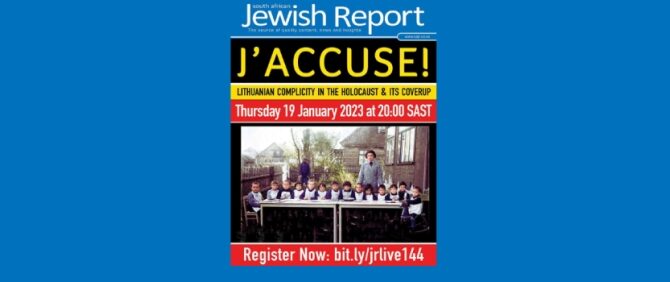
South African Jewish Report Invites You to Private Internet Screening of J’Accuse!
J’ACCUSE! Lithuanian complicity in the Holocaust and its coverup
Date: 8:00 P.M. South African Standard Time (UTC +2, same time zone as Lithuania), Thursday, January 19, 2023
Register here:
https://us02web.zoom.us/webinar/register/WN_t4pEdH4LR3ano0wwyzfEnA
What would you do if you discovered that your grandfather, a national hero in Lithuania, was also a genocidal killer of Jews? Would you keep quiet or expose the truth?
This controversial documentary exposes Lithuania’s policy of Holocaust denial and its celebration of the perpetrators of the genocide of its Jewish citizens.
This is a unique opportunity to view the documentary in full and meet the filmmakers and heroes of this ground-breaking story.
Please note that this is a private screening by invitation only. The recording of this internationally award-winning documentary will NOT be available on YouTube after the event.
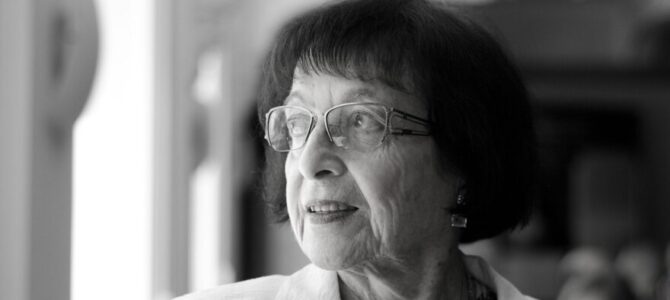
Remembering Irena Veisaitė
The Old Vilnius Town Hall and the Lithuanian Literature and Folklore Institute invite you to an evening to remember the life and work of Irena Veisaitė. The event marks Irena’s 95th birthday and will also serve to launch the book “Our Irena: Memories Irena Veisaitė” edited and compiled by Reda Pabarčienė. The book will be available for purchase at the presentation. The venue is the Old Vilnius Town Hall, 6:00 P.M., January 9, 2023. It is free and open to the public. The event will be conducted in Lithuanian.
Condolences
The Lithuanian Jewish Community is sad to report the death of Eliyahu Stoupel. He was a cardiologist who did important work on the effects cosmic rays, solar activity and geomagnetism have on human health and mortality rates. Born in Kaunas in 1929, he later moved to Israel and recently worked for the Beilinson Hospital and Medical Research Center in Petah Tikva just east of Tel Aviv. He always maintained ties with the land of his birth, came to teach university students and carried out joint studies and projects with other Lithuanian cardiologists. We extend our deepest condolences to his many friends, family members and colleagues around the world.
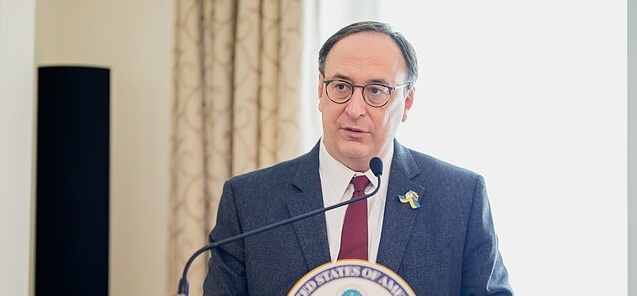
United States of America Hail Jewish Compensation by Lithuanian Parliament
Photo: Robert Gilchrist, by D. Umbrasas courtesy LRT.lt
The U.S. embassy in Vilnius said Tuesday the United States hail the Lithuanian parliament’s decision to compensate Jewish private property seized by the Nazis and Soviets to the tune of 37 million euros.
American ambassador to Lithuania Robert Gilchrist said: “The passing of this legislation is an important step in recognizing the tragedy of the Holocaust in Lithuania. It is not, however, only about addressing claims for the past. It is about preserving the memory of the Holocaust for future generations and working together against intolerance and hatred.”
U.S. special envoy for Holocaust issues Ellen Germain commented: “After the Holocaust, there was little time to create successful restitution programs before the Communist regimes nationalized private property. By passing this bill, Lithuania has taken another important step in fulfilling restitution commitments. For survivors and their families, this is a direct acknowledgement of the great wrong that was done to them.”
The Lithuanian parliament Tuesday adopted a new redaction of the existing Law on Goodwill Compensation which additionally allocates 37 million euros for compensating Jewish private property. The existing law and previous compensation payments were for communal and religious property seized by the Nazis and the Soviets. The new legislation comes into effect in January.
Lithuanian prime minister Ingrida Šimonytė proposed the new compensation package saying Lithuania has made compensation for Jewish religious community property, but hasn’t made compensation for nationalized private property.
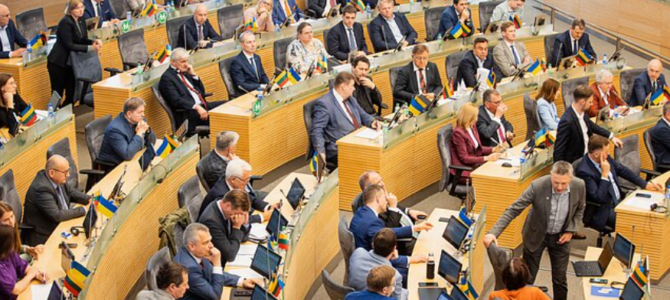
Lithuanian Parliament Allocates 37 Million Euros for Private Property Looted from Jews
The Lithuanian parliament Tuesday voted in favor of compensation to the amount of 37 million euros for private property looted from Jews by the Nazis and the Soviets.
Seventy-two MPs voted in favor, six against and two abstained in the ballot of a new redaction of the Law on Goodwill Compensation which will come into effect in January.
Lithuanian prime minister Ingrida Šimonytė proposed the new compensation package saying Lithuania has made compensation for Jewish religious community property, but hasn’t made compensation for private property nationalized.
“There are two kinds of property, and for one a solution was found, while the search for a solution to the second was sought, perhaps not entirely sincerely, perhaps sincerely… I believe the Government has succeeded in agreeing to and proposing such a solution, and today we consider this legislation,” she said.
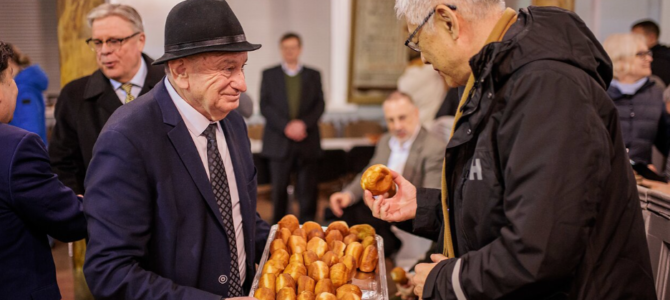
Lithuanian Radio and Television Reports on Hanukkah in Lithuania
Lithuanian state radio and television reported the beginning of Hanukkah at the Choral Synagogue in Vilnius Sunday. On Monday, the first Hanukkah light was lit, according to LRT, by speaker of parliament Viktorija Čmilytė-Nielsen.
“As we light the Hanukkah candles every year, the Jewish community sends out a message of light and friendship to all of the Lithuanian ethnic communities and to the Jewish communities around the world. We want to remind people that we can only overcome the greatest challenges by being and working together, by communicating and trying to understand one another, to light the light of knowledge, understanding and tolerance. We can all be part of the light,” Lithuanian Jewish Community chairwoman Faina Kukliansky said.
It’s customary for people to come together, have fun and share traditional Hanukkah treats such as doughnuts and latkes over all eight days of the Hanukkah holiday. Children receive traditional gifts. Faina Kukliansky recalls Litvaks traditionally ate their Hanukkah latkes with cranberry sauce.
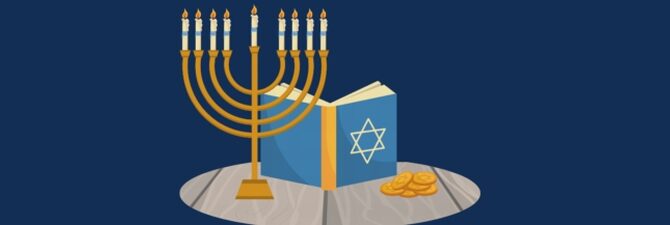
Community Hanukkah Events
In addition to all the other events already announced, the Lithuanian Jewish Community is offering a walking tour of Jewish Vilna with guide Viljamas Žitkauskas and an Israeli dance marathon with Rikudim.
The tour begins at 2:00 P.M. on Saturday, December 17, meeting at the bell tower at the Arch-Cathedral in Vilnius. Program: Tour, avdala ceremony, dinner at the Bagel Shop Café, performance by the children’s section of the Fayerlakh Jewish song and dance ensemble. Registration required. Send an email to zanas@sc.lzb.lt or call +37067881514 on weekdays between 10:00 A.M. and 6:00 P.M.
The Rikudim Israeli dance marathon will be held in the Jascha Heifetz Hall at the Lithuanian Jewish Community in Vilnius from 11:00 A.M. to 3:00 P.M. on Sunday, December 18. To register send an email to Julija at Juliradv@gmail.com.
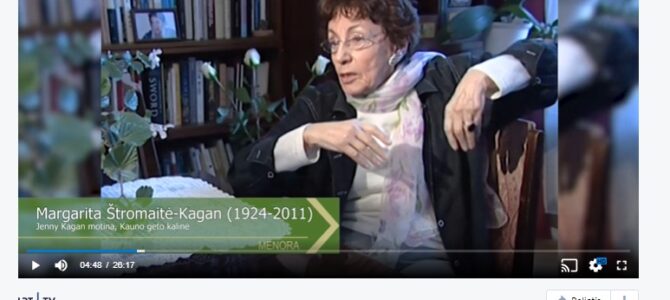
Menora Program on Lithuanian Television: A Story of Love and the Struggle to Survive
Lithuanian Radio and Television presents the story of Kaunas ghetto inmates Margarita Štromaitė and Juozas Kaganas, two inmates of the Kaunas ghetto who fell in love and survived.
Click here.
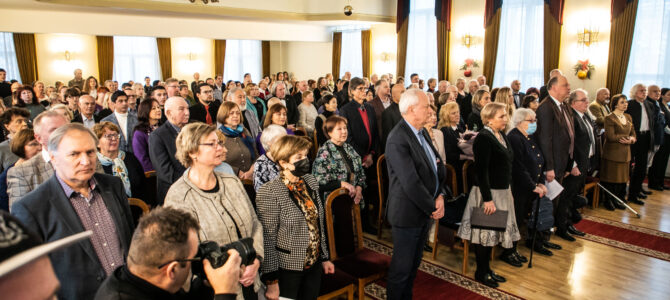
LJC Members and Friends Recognized on International Human Rights Day
To mark international Human Rights Day on December 10, Lithuania’s Department of Ethnic Minorities held an awards ceremony at the M. K. Čiurlionis School of the Arts in Vilnius and recognized the work of a number of members and friends of the Lithuanian Jewish Community, including architect and designer Victoria Sideraitė-Alon, LJC executive board member and president of the Lithuanian Makabi Athletics Club Semionas Finkelšteinas, chairman of the Klaipėda Jewish Community Feliksas Puzemskis, Vilnius Jewish Public Library director Žilvanas Bielauskas, violinist and member of the Fayerlakh Jewish song and dance ensemble Boris Kirzner, Fayerlakh chairwoman Larisa Vyšniauskienė and documentary filmmaker and television producer Lilija Kopač.
The Ethnic Minorities Department awards are distributed to members of ethnic communities, the media and NGOs for their work increasing ethnic harmony, encouraging cultural diversity and unifying multicultural Lithuania.
We sincerely congratulate all prize recipients on the recognition of their work forging a better future for the Lithuanian Jewish Community and Lithuania.
Condolences
The Lithuanian Jewish Community and LJC chairwoman extend our deepest condolences on the death of Adolfas Šleževičius to his many friends and relatives. The Lithuanian prime minister from 1993 to 1996 was born February 2, 1948 and his parents rescued Jews from the Holocaust. His Government stabilized the Lithuanian economy not least of all through the re-introduction of the Lithuanian currency the litas, and through improved relations with neighboring countries in the aftermath of the break-up of the Soviet Union. He is the author of over 50 articles and two books. Both his parents were recognized as Righteous Gentiles in 1994 by the Yad Vashem Holocaust Commemoration and Education Institute in Jerusalem.
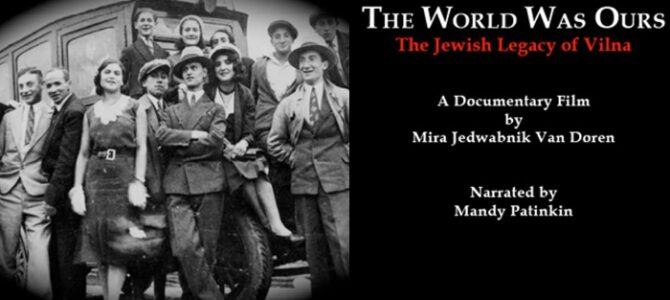
Upcoming Vilnius Jewish Public Library Events
The Vilnius Jewish Public Library presents a lecture by Oleksii Chebotarov called “Topography of Pogroms: Spatial and Social History of Anti-Jewish Violence on the Imperial Peripheries” on December 15.
On December 22 the library will feature an evening of poetry and music by Leonard Cohen.
On December 29 the library will screen the made-for-tv documentary film “The World Was Ours” (2007) about the pre-WWII Jewish community of Vilnius. According to imdb:
“A documentary chronicling the rich, vibrant history of the Jewish community of Vilna (then Poland, now Lithuania) known as ‘The Jerusalem of Lithuania’ before its destruction in World War II.”
For more information, send an e-mail to vzvbvjpl@gmail.com or call 8 604 15765.
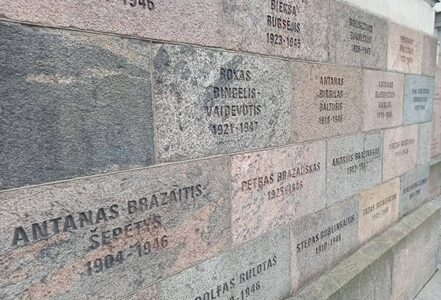
NATO 2023 in Lithuania: Rife with Political Pitfalls
Photo: Outer wall of so-called Genocide Museum on Vilnius’s main street near parliament. Personal collection.
by Grant Gochin
One of the greatest public relations catastrophes of president Reagan’s tenure was his May, 1985, visit to a cemetery in Bitburg, Germany, which contained numerous members of the SS. Today, nearly four decades later, the visit is still remembered with anger, amazement and mostly, for America, embarrassment.
NATO has announced that the next meeting of NATO heads of state and government will be held in Vilnius, Lithuania, on July 11-12, 2023. There are, unfortunately, obvious parallels to Reagan’s “goodwill” visit to Bitburg.
In World War II, and primarily in the second half of 1941, about 200,000 Lithuanian Jews–about 96%–were systematically expelled from their homes, robbed, starved, tortured, and brutally murdered primarily by ethnic Lithuanian death squads euphemistically referred to as “auxiliary police” units. Lithuania does not acknowledge the fact that most of the mass murderers were ethnic Lithuanians. To the contrary, Lithuania in many cases has elevated the stature of many of those who led the Lithuanian Holocaust, arguing that they were anti-Soviet. This itself is an echo of the Nazis’ canard conflating Jews with Communism.
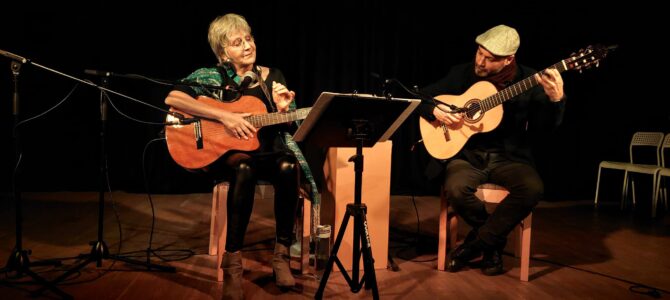
Alejandra Czarny Yiddish Music Concert in Kaunas Great Success
Kaunas Jewish Community chairman Gercas Žakas reports the concert of Yiddish music by vocalist Alejandra Czarny and Michel Gonzalez on guitar in Kaunas was a great successe with the audience.
The concert was part of a series the Kaunas Jewish Community has been putting on called “Yiddish Hear Again in Kaunas.” This concert was called “Inspired by Grandmother’s Songs.” Czarny’s grandmother and that side of the family all came from Kaunas. She’s a transplant to south Florida from Argentina and charmed the audience with tango melodies along with Yiddish favorites, which became sing-alongs with the audience, and Alejandra Czarny’s own creations which at times evoked Venezuelan music, according to Gercas Žakas.
Alejandra Czarny and Michel Gonzalez were also scheduled to perform at the restored synagogue in Alytus on November 30.
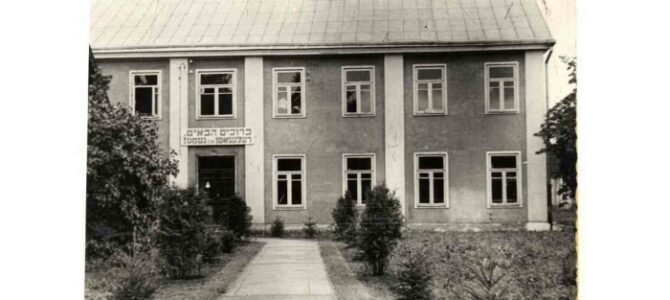
Split Identity: Jewish Scholarship in the Vilna Ghetto
Photo: Exterior of YIVO building in Vilnius, ca. 1933. Courtesy YIVO.
by David E. Fishman
ABSTRACT
In this essay David Fishman draws a comparison between yidishe visnshaft, or Jewish studies scholarship, and Judenforschung, the Nazi field of anti-Semitic Jewish studies used to justify the persecution and extermination of Jews in scientific terms. He examines the work of Zelig Kalmanovitch, who had been a well-known scholar and co-director of YIVO before World War II, during the time when he was forced to produce scholarship as a member of the Jewish slave labor brigade assigned to the Einsatzstab Reichsleiter Rosenberg (ERR) in Vilna. Fishman notes the remarkable scholarly accomplishments Kalmanovitch was able to achieve in a time of enormous adversity. He also demonstrates several junctures in which Kalmanovitch, a meticulous scholar, omitted facts or altered scholarship in order to save lives. These dual impulses of preserving historical truths about Jewish communities and a willingness to obscure facts over which people could be killed contribute to Fishman’s assessment that Kalmanovitch’s scholarship emerged from erudition, love and dedication to the Jewish people about whom he wrote, the very opposite of the purposes for which his scholarship was obtained by his Nazi slave masters.
܀
On June 16, 1942, Herbert Gotthardt, a staff member of the Einsatzstab Reichsleiter Rosenberg (ERR) in Vilna, instructed Zelig Kalmanovitch to prepare an essay and bibliography on the Karaïtes. Kalmanovitch, a well-known scholar and co-director of YIVO before the war, was a member of the Jewish slave labor brigade assigned to the ERR which segregated Jewish and other books, manuscripts and documents into two categories: valuable items to be sent to Germany, and valueless items to be destroyed. The former YIVO co-director was an expert bibliographer in this work brigade, nicknamed the paper brigade, based in the YIVO building at 18 Wiwulskiego Street. The brigade was headed by librarian Herman Kruk and consisted of twenty physical laborers and twenty intellectuals, including the Yung-Vilne poets Abraham Sutzkever and Szmerke Kaczerginski.
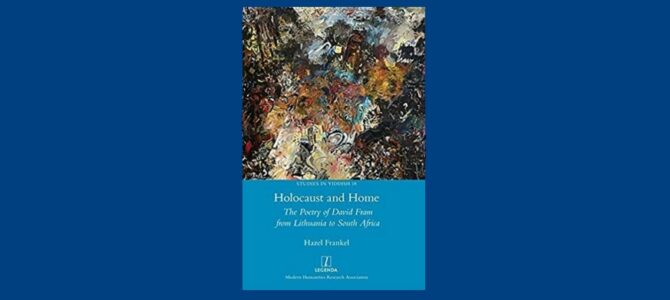
Holocaust and Home: The Poetry of David Fram from Lithuania to South Africa
Cover: Hazel Frankel, “Holocaust and Home: The Poetry of David Fram from Lithuania to South Africa.” Legenda, 2021. 230 pp.
My mother started learning Yiddish late in life. I felt as if she was reaching out to her dead parents, trying to connect with them. Both her mother and her father were immigrants to South Africa from Lithuania, one from the town of Shadova, the other from Pokroy. My grandfather, Abe, who came from a long line of yeshiva bochers, attended the famed Telz yeshiva. Intellectually curious, he read War and Peace in the original Russian. Later, at the Claremont shul in Cape Town, he gave many of the Saturday afternoon shiurim, written in Yiddish but delivered in English.
His wife, Anne, for who I am named, was nine years his junior. They owned a dress shop in Cape Town and, before the war, Abe went on business trips to Europe to buy the latest fashions, often with specific customers’ needs in mind. Both Abe and Anne died in their fifties, several years before I was born. I know them only from photographs. Their sepia-toned wedding photo hung in our breakfast room, where we ate all our meals. Abe was short, wore glasses, and gazed solemnly at the camera. Anne seemed softer, gentler, and had a twenties-style headdress that looked like a shower cap. There were odd flecks of white on the image that I always imagined was confetti but must have been blemishes on the photographic paper or the camera lens.
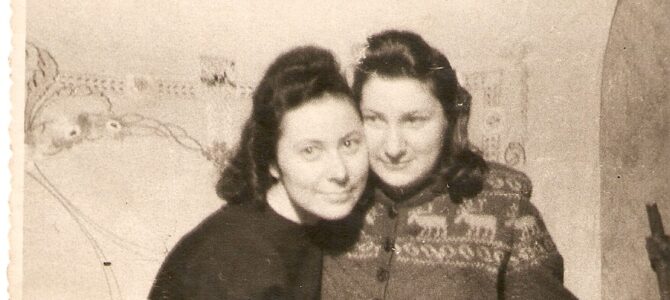
Condolences
Righteous Gentile Janina Vansovičiūtė-Grigaliūnienė has died. We extend our deepest condolences to her friends and family members.
Janina Vansovičiūtė-Grigaliūnienė, then Janina Vansovičiūtė, lived in an apartment in Kuršėnai which her parents had rented with Sofia Vashkevitch, who was using forged documents showing she was Janina’s sister. After the war both girls returned to the Vansovičius home in Raseiniai. Janina and her parents Jonas and Natalija were recognized as Righteous among the Nations by the Yad Vashem Holocaust authority in 2011.

